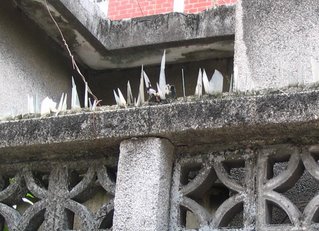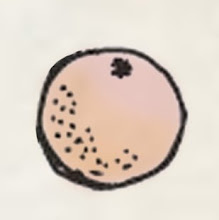An interesting reuse of waste materials...

Actually, most of Taiwan's recycling practices are less unnerving than broken glass in a concrete wall as a barbed wire substitute.
In fact, I've generally been pretty impressed with environmentalism in Taiwan. Besides the terrible air quality due to scooter and bus exhaust (which actually the Taiwanese government has already taken measures to improve), there are some things that Taiwanese people do that North Americans could learn from.
For example, 7-11, which is by far the most prevalent (convenience or otherwise) store in Taiwan, charges you one NT dollar for a plastic bag. The monetary value is equivalent to 3 cents Canadian, but just the fact that they ask you, and that it costs anything at all, makes you stop and think about whether you really need one. Most other stores will either ask if you want one before giving it to you, or not give you one unless you ask. They will comfortably watch you struggle to stuff a cleaver, laundry line, cook pot, 3 cans of beer and sanitary napkins into your shoulder bag and be satisfied that this is what you want (if you wanted a bag, you would've asked!).
There is separated garbage and recycling in all the subway stations and public centres. In fact, stand-alone garbage cans are very hard to find - means you are less likely to ask for that plastic bag and extra napkin, lest you find yourself carrying them a long distance before finding respite!
The neighbourhood garbage man collects not only paper, plastic and cans, but also two types of compost - cooked kitchen waste for pig feed and uncooked for regular compost.
Mos Burger, a popular fast food outlet, has not only the regular recycling stations, but also bins where you can stack your used plastic cups for wash and reuse.
Food courts in shopping malls often have a dishware and cutlery sharing system so that dishes can be collected and washed collectively -- that means no disposable waste.
There is generally less paranoia about hygienic packaging or packaging having to be untouched to give to customers - e.g. unused sugar packets and creamers don't just get dumped in the garbage, but are put away and reused.
Generally less packaging when buying things - sometimes the seller wrapping your finger snack in a napkin or thin paper sleeve is enough (no need for a take-away container, two plastic bags and a gas mask just to hand you fishballs on a stick).
When there is packaging, it is more often paper than plastic.
No dryers! Because of the mild climate, people air-dry their clothes year round.
Better accessibility to item-repair. Because labour costs are so high in the West, it's often cheaper to throw old things away than to have them repaired. Low labour costs in Asia make for more cobblers, fix-it men and less waste. (People in general work longer hours for less money, not just labour workers, which is a system with its drawbacks too, though hard work without complaint seems to be a characteristic of the culture).


3 Comments:
India and Pakistan do the glass stuck in concrete thing too. That's awesome that they're environmentally-conscious. There isn't much of that here, however in the hill stations, plastic bags are banned (since they don't have any place to put their garbage), so they use cloth or newspaper bags (the cloth ones work a lot better - the newspaper ones are more like a big envelope for your stuff).
Mmm.... Mos Burger. Yum!
Oh, Taipei sounds amazing on the environmental front! I'm so impressed! We don't even have public garbage cans or govt garbage collection, people just throw their garbage onto the street. It's awful.
hehehe, I guess anywhere can look environmentally friendly compared to India though!
That's interesting about the hill stations. So do they only produce compostable garbage?
I wrote this post with you in mind because I knew you'd appreciate it! Thanks for posting.
No, I think they still produce all other types of garbage, just no plastic bags. I could be wrong though.
Post a Comment
<< Home